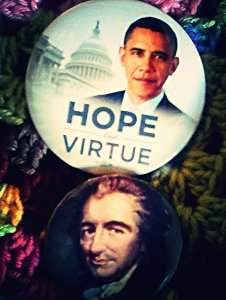 This is a President Obama story, an Inauguration Day story. It is also a Thomas Paine story.
This is a President Obama story, an Inauguration Day story. It is also a Thomas Paine story.
While sifting through the random items that somehow made it from my old house to my new(ish) apartment this past December, I came across a large button celebrating the 2009 inauguration of then-new President Barack Obama. Round, bright white, and oversized, the button featured Obama’s portrait and the words “Hope and Virtue” in large, bold type. I had ordered it online in those giddy first days of the first Obama term, because I liked the design — and because I wanted to brag on the victory of “my” President after eight dark and fearful years of the George W. Bush administration. Good riddance, Scooter Libby and “Darth” Cheney. Hello, Hope and Virtue.
Though I have to admit that at the time, the phrase “hope and virtue” struck my ear a bit oddly. “Virtue,” seemed a quaint and old-fashioned term. When was the last time “virtue” had been invoked in American political discourse? No matter. It was still one cool piece of swag.
This button soon joined the collection of Obama swag I had amassed during the election, which in time, like many of my collections, somehow dispersed itself and then disappeared into the variegated and unorganized museum of things known as “my stuff.” I forgot about it.
During the autumn of 2009, I read a book called The Age of Reason, and instantly became fascinated with its author. A Paine biography later yielded an interesting connection: Obama’s first inaugural address contained a quote from Paine (sadly uncredited), that had been lifted from the first “Crisis Paper,” written in the winter of 1776, while Washington’s army was retreating across the frozen Jersies. It was meant to lift the spirits of both the American soldiers and citizens during the “times that tried men’s souls.” The passage Obama used:
“Let it be told to the future world, that in the depth of winter, when nothing but hope and virtue could survive, that the city and the country, alarmed at one common danger, came forth to meet and to repulse it.”
Of course, by that time I had forgotten my cute, flashy Obama button with its quaint, dated phrasing, but when it turned up again nearly eight years later, while I was sorting through some boxes of things I’d saved, it seemed ironically appropriate that I should rediscover it at the end of Obama’s second term — both literally and figuratively “in the depth of winter.” This time, of course, I instantly recognized the key words as Paine’s phrasing, indeed old-fashioned — and utterly appropriate. My (re)discovery of this ephemeral but suddenly very relevant object felt like a little nudge from the universe, the dropping of a cosmic hint – a gift and a reminder from both Thomas Paine and President Obama to hold fast to our nation’s professed ideals, even – especially – at a time when those ideals seem more fragile and in more danger than ever before.
Obama’s inauguration was a celebration of hope, an amazing display of diversity and all that was best about America. I kept the TV on for hours all through those festivities, and (it seemed) for most of the weekend after. This year, needless to say, I won’t be looking at my TV on Friday unless it’s to watch PBS Kids or the Create channel.
I will, however, find a place to display my “vintage” Obama button – probably someplace near a picture of Thomas Paine (I have several). Like Paine, I will endeavor to resist our “common danger” with word and with action, and like “my” President, I will have the audacity to hope for better days.
“Say not that thousands are gone, turn out your tens of thousands; throw not the burden of the day upon Providence, but ‘show your faith by your works,’ that God may bless you. It matters not where you live, or what rank of life you hold, the evil or the blessing will reach you all. The far and the near, the home counties and the back, the rich and the poor, will suffer or rejoice alike. The heart that feels not now is dead; the blood of his children will curse his cowardice, who shrinks back at a time when a little might have saved the whole, and made them happy.”
– Thomas Paine, The American Crisis, Number One, 1776

“[H]old fast to our nation’s professed ideals, even – especially – at a time when those ideals seem more fragile and in more danger than ever before.” I think this is the best advice. Thank you. And thank Paine, Obama, and the universe.
LikeLike